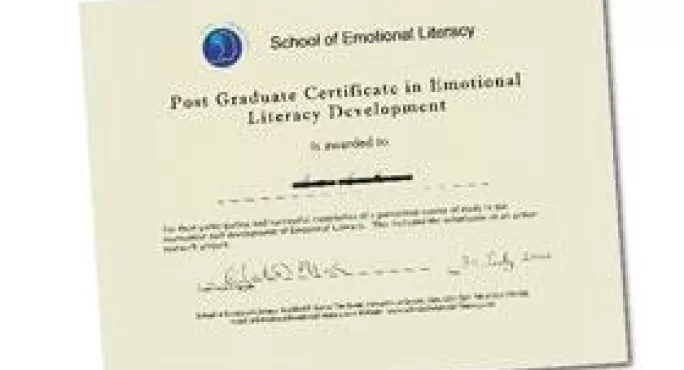Worthless course

An emotional literacy qualification for which hundreds of teachers and school staff have studied is being rejected by British universities because its only accreditation is from a website based on a small Pacific island.
At least 35 teachers have grouped together to complain about the course, offered in Britain by the School of Emotional Literacy, saying that it is “not worth the paper it is printed on”.
Local authorities, including Edinburgh and Glasgow, have spent more than Pounds 300,000 on the school’s courses, reflecting the increase in interest in emotional literacy, which teaches staff to better communicate feelings and understand those of their pupils.
Elizabeth Morris, the school’s principal, said she was surprised to learn of the problems and has since dropped the title of “Dr”, which she had been awarded by the same internet university, the University of Action Learning, whose home is in tiny Vanuatu, a thousand miles east of Australia. “I’ve got no wish to misrepresent myself, and I never have done,” she said. “I can absolutely assure you that if I had had any idea about this, I would not have said the things I’ve said or been calling myself a doctor.”
Carole Davies, the headteacher of Lydden Primary in Kent, is among those who had been led to believe their qualification would be accredited. “It was not valuable at all. Thousands and thousands of words for no practical use and no educational status,” she said.
The school, which has a Scottish base in Kirkcaldy, has offered training courses in Glasgow, Edinburgh, Belfast, Bristol, Birmingham, Dudley, Cumbria, Thurrock and throughout Kent.
But when those students tried to use the qualifications for credits towards further study, the universities they approached rejected the certificates as worthless without another university’s accreditation.
Students have been turned away by Canterbury Christ Church University, London Metropolitan University, the Open University and Bristol University.
Annie Hamlaoui, a former school guidance counsellor who studied and worked with the school, has co-ordinated a group of more than 35 unhappy students.
She, too, has tried to use the certificate for further study. “I feel very disappointed and let down because it is now obvious that, from an academic point of view, this certificate is not worth the paper it is written on,” she said. “It will not help me in any way to gain access to higher education courses to help further my career.”
Whether the students would have fared better with direct UAL accreditation is unknown: none was willing to pay Pounds 300 for an accreditation stamp from a website based in a government office in Melanesia. One said she had been too “embarrassed” to go back to the local authority which funded her certificate course to ask for another Pounds 300.
She had not used the certificate for further studies because “nobody would take it seriously”. She added: “To me, it was a shambles, a big money- making scheme.”
But other students were happy with the certificates and diplomas, saying the training was of a good quality, regardless of the lack of accreditation.
Ms Morris has now ended the agreement with UAL, but did not do so until some time after the Distance Education and Training Council revoked its authority to award degrees in February 2005.
Ms Morris said she had not realised that UAL had lost its accreditation, nor that it was run out of Vanuatu, when she was offering the courses to students and completing her own doctorate.
She has since told people that she and her course have won accreditation from Middlesex University. But enquiries to Middlesex revealed that Ms Morris and the school have no such accreditation. The accreditation was for an entirely separate training company in Gloucestershire which may hire Ms Morris to teach a course.
Ms Morris admitted to “sloppiness” in how she had described the Middlesex accreditation, and agreed that courses offered through her school had no accreditation.
“I’m quite upset about this,” she said. “I need to go and find out more about it because I have felt absolutely comfortable about saying `I’ve got this doctorate and I deserve this doctorate.’ But now I need to check out more.”
Keep reading for just £1 per month
You've reached your limit of free articles this month. Subscribe for £1 per month for three months and get:
- Unlimited access to all Tes magazine content
- Exclusive subscriber-only stories
- Award-winning email newsletters